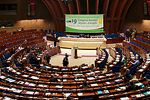|
Debates on social integration in Europe
 The members of the Congress of Local and Regional Authorities of
the Council of Europe, adopted two resolutions during their 19th
session in Strasbourg (France) on 28 October 2010, urging local
and regional authorities to take specific measures for the
integration of Muslim women and the integration of young people from disadvantaged
neighbourhoods.
The members of the Congress of Local and Regional Authorities of
the Council of Europe, adopted two resolutions during their 19th
session in Strasbourg (France) on 28 October 2010, urging local
and regional authorities to take specific measures for the
integration of Muslim women and the integration of young people from disadvantaged
neighbourhoods.Speakers at the debate  Amy Koopmanschap (Netherlands, SOC) Amy Koopmanschap (Netherlands, SOC)The raporteur Amy Koopmanschap introduced the debate on “Cultural integration of Muslim women in European cities”. The report on this subject, together with the resolution adopted, underline the difficulties facing Muslim migrant women, particularly the phenomenon of double cultural disaffiliation whereby they are often disconnected from their culture of origin and unable to identify with the dominant culture of the host country. The resolution stresses the role of local and regional authorities, calling upon them to implement specific policies on education, language instruction, raising awareness of municipal employees about integration issues, establishing places whey they can meet and discuss including local media initiatives, and participation in sports activities.
Documents of the debates
Cultural integration of Muslim women in European cities Integration of young people from disadvantaged neighbourhoods
Contacts
Communication Division +33 (0)3 90 21 52 40 congress.com@coe.int Table Office Dolores Ríos Turón +33 (0)3 88 41 34 51 congress.session@coe.int |
 Print
Print  Send
Send  Français
Français  Naima Azough, former member of the lower house of the
Netherlands Parliament
Naima Azough, former member of the lower house of the
Netherlands Parliament Eunice Campbell-Clark (United Kingdom)
Eunice Campbell-Clark (United Kingdom)